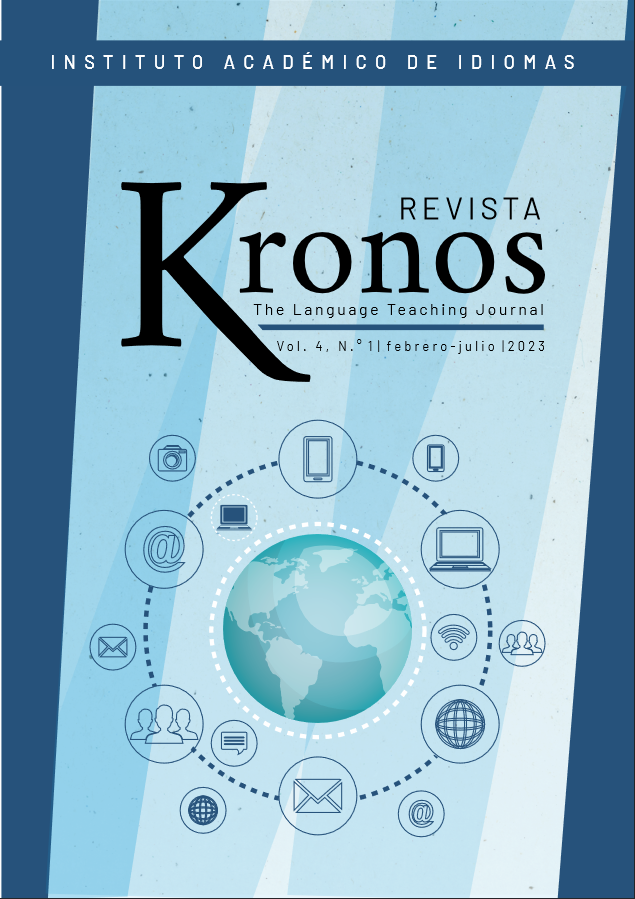Reflexión sobre las actividades de servicio a la comunidad: influencia de la enseñanza aprendizaje a través de actividades de servicio a la comunidad en estudiantes de pregrado.
DOI:
https://doi.org/10.29166/kronos.v4i1.4246Palabras clave:
Aprendizaje-servicio, educación en inglés, reflexión, educación de pregrado, servicio comunitario, formaci´´on profesionalResumen
El aprendizaje-servicio constituye una actividad relativamente nueva en los contextos de educación superior ecuatoriana, donde el objetivo es brindar un servicio a la comunidad necesitada mientras los estudiantes de pregrado participantes aprenden sobre su futura profesión ejerciendo la misma en contextos reales. Este artículo presenta la importancia de los cambios y la reflexión que los estudiantes de Pedagogía de los Idiomas Nacionales y Extranjeros (PINE) antes mencionados experimentaron durante las prácticas de aprendizaje-servicio incluidas en su malla curricular. Los aprendices participantes fueron invitados a una entrevista en profundidad. Se les pidió que contaran sus historias y experiencias durante su participación en proyectos donde enseñaron inglés a niños de 5 a 11 años en modalidad virtual en diferentes programas del PINE en el último año. Estas entrevistas fueron posteriormente analizadas utilizando el método de análisis narrativo en su forma de análisis de contenido, que consiste en escuchar los testimonios, luego de grabarlos, transcribirlos y codificarlos, extrayendo de las narrativas obtenidas la información más relevante para la investigación. Luego del análisis de las entrevistas, los datos mostraron que los estudiantes del PINE, luego de un tiempo participando en estas actividades, experimentaron muchos cambios en sus prácticas referentes a su formación profesional vinculada a la comunidad y que la reflexión jugó un papel vital durante el proceso. Después del análisis, los resultados muestran que la exposición de los estudiantes a las prácticas de aprendizaje-servicio influyó significativamente en sus percepciones sobre la enseñanza y las prácticas que consideran importantes durante la instrucción formal.
Descargas
Citas
Blouin, D. D., & Perry, E. M. (2009). Whom Does Service Learning Really Serve? Community-Based Organizations’ Perspectives on Service Learning. Teaching Sociology, 37(2), 120–135. https://doi.org/10.1177/0092055X0903700201
Bringle, R. G., & Hatcher, J. A. (1996). Implementing Service Learning in Higher Education. The Journal of Higher Education, 67(2), 221. https://doi.org/10.2307/2943981
Bruce‐Davis, M., & Chancey, J. (2012). Connecting students to the real world: Developing gifted behaviors through service learning. Psychology in the Schools, 49. https://doi.org/10.1002/pits.21622
Clandinin, D. J., & Caine, V. (2008). Narrative Inquiry. In The SAGE Encyclopedia of Qualitative Research Methods. SAGE Publications, Inc. https://doi.org/10.4135/9781412963909.n275
Deba, A. A., Jabor, M. K., Buntat, Y., & Musta’mal, A. H. (2014). Potential of service-learning on students’ interpersonal skills development in technical and vocational education. Asian Social Science, 10(21), 1.
Francis, M. (2018). A Narrative Inquiry Into the Experience of Being a Victim of Gun Violence. Journal of Trauma Nursing, 25(6), 381–388. https://doi.org/10.1097/JTN.0000000000000406
Lambright, K. (2008). Lessons Outside of the Classroom: Examining the Effectiveness of Service Learning Projects at Achieving Learning Objectives. Journal of Public Affairs Education, 14(2), 205–217. https://doi.org/10.1080/15236803.2008.12001520
Lieblich, A., Tuval-Mashiach, R., & Zilber, T. (1998). Narrative Research: Reading, Analysis, and Interpretation (Vol. 47). SAGE Publications, Inc. https://us.sagepub.com/en-us/nam/narrative-research/book8018
Miller, M. (2012). The role of service-learning to promote early childhood physical education while examining its influence upon the vocational call to teach. Physical Education & Sport Pedagogy, 17(1), 61–77. https://doi.org/10.1080/17408981003712810
Moen, T. (2006). Reflections on the Narrative Research Approach. International Journal of Qualitative Methods, 5(4), 56–69. https://doi.org/10.1177/160940690600500405
Ojala, J. (1997). Lost in space? The concepts of planetary phenomena held by trainee primary school teachers. International Research in Geographical and Environmental Education, 6(3), 183–203. https://doi.org/10.1080/10382046.1997.9965047
Oleson, A., & Hora, M. T. (2014). Teaching the way they were taught? Revisiting the sources of teaching knowledge and the role of prior experience in shaping faculty teaching practices. Higher Education, 68(1), 29–45. https://doi.org/10.1007/s10734-013-9678-9
Pajares, F. (1993). Preservice Teachers’ Beliefs: A Focus for Teacher Education. Action in Teacher Education, 15(2), 45–54. https://doi.org/10.1080/01626620.1993.10734409
Prentice, M., & Robinson, G. (2010). Improving Student Learning Outcomes with Service Learning. Higher Education. https://digitalcommons.unomaha.edu/slcehighered/148
Procee, H. (2006). Reflection in Education: A Kantian Epistemology. Educational Theory, 56(3), 237–253. https://doi.org/10.1111/j.1741-5446.2006.00225.x
Savin-Baden, M., & Niekerk, L. V. (2007). Narrative Inquiry: Theory and Practice. Journal of Geography in Higher Education, 31(3), 459–472. https://doi.org/10.1080/03098260601071324
Universidad San Francisco de Quito. (2022). Programa de Aprendizaje y Servicio (PASEC) | Universidad San Francisco de Quito. https://www.usfq.edu.ec/es/programa-de-aprendizaje-y-servicio-pasec
Ward, J. R., & McCotter, S. S. (2004). Reflection as a visible outcome for preservice teachers. Teaching and Teacher Education, 20(3), 243–257. https://doi.org/10.1016/j.tate.2004.02.004
Wells, K. (2011). Narrative Inquiry. Oxford University Press.
Whitney, A. E., Olan, E. L., & Fredricksen, J. E. (2013). Experience Over All: Preservice Teachers and the Prizing of the “Practical.” English Education, 45(2), 184–200. https://www.jstor.org/stable/23364877
Publicado
Cómo citar
Número
Sección
Licencia
Derechos de autor 2023 Sandra Jazmin Gonzalez Gonzalez

Esta obra está bajo una licencia internacional Creative Commons Atribución-NoComercial-CompartirIgual 4.0.












